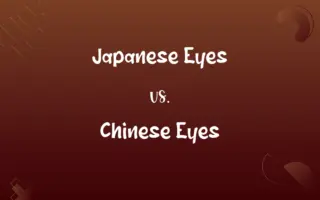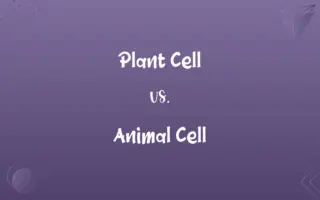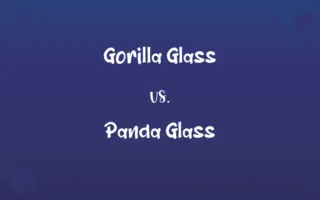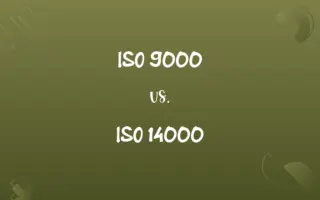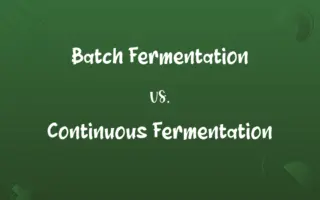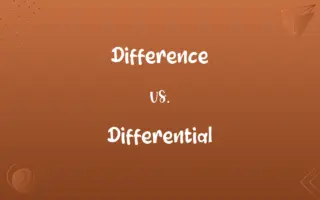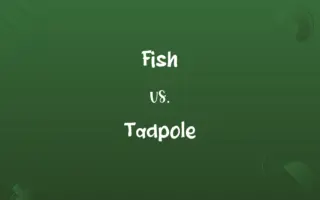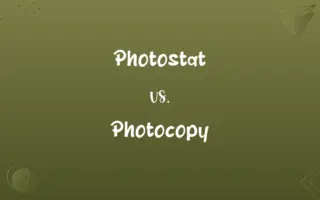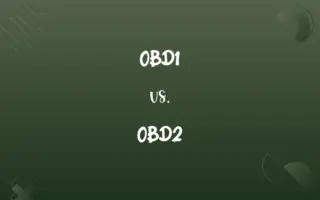Polymer vs. Macromolecule: Know the Difference

By Shumaila Saeed || Published on January 11, 2024
Polymers are large molecules composed of repeated subunits, while macromolecules are any large molecules, including polymers.
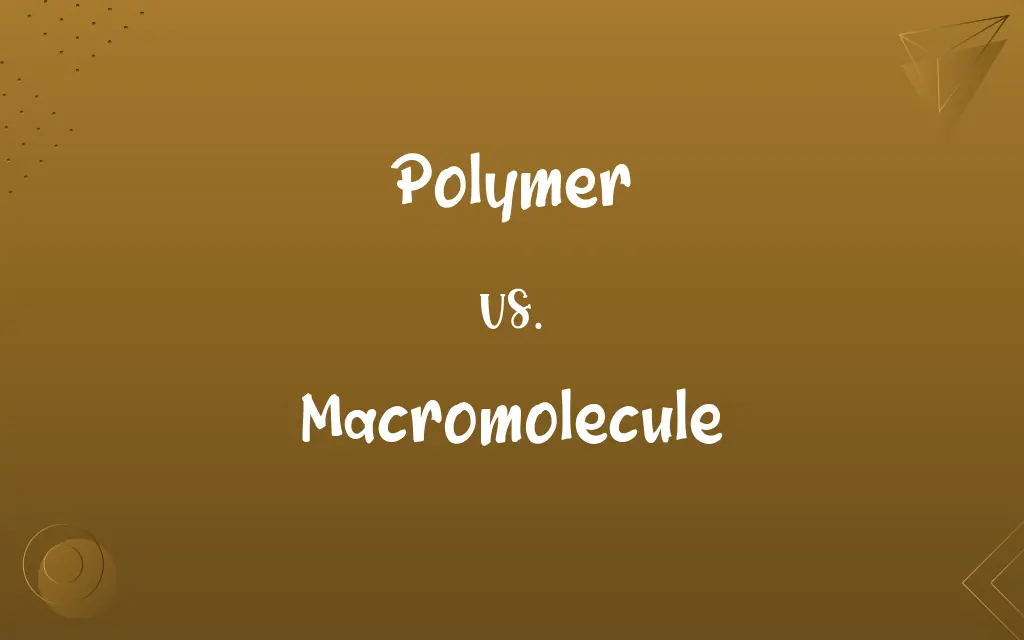
Key Differences
Polymers are substances whose molecules have a high molar mass and are composed of a large number of repeating units. Macromolecules, on the other hand, refer to any large molecule, irrespective of its composition and structure. While all polymers are macromolecules, not all macromolecules are polymers.
Shumaila Saeed
Jan 11, 2024
The term polymer specifically refers to the chemical structure where small units, monomers, link together. Macromolecules can be polymers, but they also include other large biological molecules like proteins, which are not polymers in a strict sense. Thus, macromolecules encompass a broader range of substances.
Shumaila Saeed
Jan 11, 2024
Polymers can be naturally occurring, like cellulose in plants, or synthetic, such as plastic. Macromolecules include DNA, proteins, and polysaccharides, along with synthetic polymers. The distinction lies in the diversity of macromolecules, which include but are not limited to polymers.
Shumaila Saeed
Jan 11, 2024
The synthesis of polymers involves chemical reactions that link monomers. Macromolecules, particularly those in biological systems, are formed through various processes, including polymerization. The formation process of macromolecules can be more complex than that of polymers.
Shumaila Saeed
Jan 11, 2024
In terms of functionality, polymers are often recognized for their structural and material properties, like elasticity in rubber. Macromolecules, especially in biology, have functional roles such as information storage (DNA) or catalysis (enzymes), demonstrating their diverse nature.
Shumaila Saeed
Jan 11, 2024
ADVERTISEMENT
Comparison Chart
Definition
Large molecules made by linking repeated subunits (monomers).
Any large molecule, including polymers and other biological molecules.
Shumaila Saeed
Jan 11, 2024
Formation
Through polymerization of monomers.
Various processes, including polymerization.
Shumaila Saeed
Jan 11, 2024
Occurrence
Can be both natural or synthetic.
Mostly natural, but includes synthetic polymers.
Shumaila Saeed
Jan 11, 2024
Function
Often structural or material based.
Diverse, including structural, genetic, and enzymatic functions.
Shumaila Saeed
Jan 11, 2024
ADVERTISEMENT
Polymer and Macromolecule Definitions
Polymer
A polymer is a material composed of long molecular chains derived from the joining of many smaller molecules.
Polyvinyl chloride (PVC), used in pipes, is a polymer made from vinyl chloride monomers.
Shumaila Saeed
Dec 28, 2023
Macromolecule
A macromolecule is any very large molecule, typically involving thousands of atoms, forming a complex structure.
Starch is a macromolecule serving as an energy storage in plants.
Shumaila Saeed
Dec 28, 2023
Polymer
A polymer is a substance with a molecular structure built up chiefly or completely from a large number of similar units bonded together.
Polyethylene, used in plastic bags, is a polymer made from repeating ethylene units.
Shumaila Saeed
Dec 28, 2023
Macromolecule
Macromolecules are large complex molecules with high molecular weight, often found in living organisms.
Proteins, macromolecules, play critical roles in the body’s structure and metabolism.
Shumaila Saeed
Dec 28, 2023
Polymer
Polymers are large molecules made by bonding together many smaller molecules, called monomers.
Nylon, a polymer, is extensively used in the textile industry for its strength and flexibility.
Shumaila Saeed
Dec 28, 2023
ADVERTISEMENT
Macromolecule
A macromolecule is a very large molecule, such as a polymer or protein, composed of hundreds or thousands of atoms.
DNA is a macromolecule that carries genetic information in living organisms.
Shumaila Saeed
Dec 28, 2023
Polymer
Polymers are substances whose structure consists of multiple repeating units, creating large macromolecules.
Polystyrene, a polymer, is widely used in packaging for its lightweight and insulating properties.
Shumaila Saeed
Dec 28, 2023
Macromolecule
A macromolecule is a substantial molecule necessary for life, including proteins, nucleic acids, and polysaccharides.
Enzymes are macromolecules that catalyze biochemical reactions in living organisms.
Shumaila Saeed
Dec 28, 2023
Polymer
A polymer is a chemical compound with molecules bonded together in long, repeating chains.
The rubber in tires is a polymer composed of isoprene units linked together.
Shumaila Saeed
Dec 28, 2023
Macromolecule
Macromolecules are giant molecules formed by the joining of smaller organic molecules.
Cellulose, a macromolecule, is a key structural component of plant cell walls.
Shumaila Saeed
Dec 28, 2023
Polymer
Any of numerous natural and synthetic compounds of usually high molecular weight consisting of up to millions of repeated linked units, each a relatively light and simple molecule.
Shumaila Saeed
Dec 27, 2023
Macromolecule
A very large molecule, such as a polymer or protein, consisting of many smaller structural units linked together. Also called supermolecule.
Shumaila Saeed
Dec 27, 2023
Polymer
(organic chemistry) A long or larger molecule consisting of a chain or network of many repeating units, formed by chemically bonding together many identical or similar small molecules called monomers. A polymer is formed by polymerization, the joining of many monomer molecules.
Shumaila Saeed
Dec 27, 2023
Macromolecule
A very large molecule, especially used in reference to large biological polymers (e.g. nucleic acids and proteins).
Shumaila Saeed
Dec 27, 2023
Macromolecule
A very large molecule, especially a polymer having from hundreds to many thousands of atoms, such as DNA, RNA, protein, polysaccharide, polyethylene, polycarbonate, etc.
Shumaila Saeed
Dec 27, 2023
Polymer
Any one of two or more substances related to each other by polymerism; specifically, a substance produced from another substance by chemical polymerization.
Shumaila Saeed
Dec 27, 2023
Macromolecule
Any very large complex molecule; found only in plants and animals
Shumaila Saeed
Dec 27, 2023
Polymer
A naturally occurring or synthetic compound consisting of large molecules made up of a linked series of repeated simple monomers
Shumaila Saeed
Dec 27, 2023
Repeatedly Asked Queries
Can macromolecules be found in living organisms?
Yes, examples include DNA and proteins.
Shumaila Saeed
Jan 11, 2024
Are carbohydrates macromolecules?
Yes, they are a type of biological macromolecule.
Shumaila Saeed
Jan 11, 2024
How are macromolecules relevant in biology?
They are essential for structures, functions, and regulation in organisms.
Shumaila Saeed
Jan 11, 2024
What is a macromolecule?
Any large molecule, including biological molecules and polymers.
Shumaila Saeed
Jan 11, 2024
Do macromolecules play a role in genetics?
Yes, DNA, a macromolecule, carries genetic information.
Shumaila Saeed
Jan 11, 2024
What distinguishes a polymer from other macromolecules?
Polymers are specific types of macromolecules made from repeating units.
Shumaila Saeed
Jan 11, 2024
What role do macromolecules play in the human body?
They are crucial for structure, function, and regulation of the body's tissues and organs.
Shumaila Saeed
Jan 11, 2024
Do macromolecules dissolve in water?
It depends on the macromolecule; some do, others don't.
Shumaila Saeed
Jan 11, 2024
What is the difference between monomers and polymers?
Monomers are single units, and polymers are chains of these units.
Shumaila Saeed
Jan 11, 2024
Can polymers be biodegradable?
Yes, some natural polymers and synthetic biodegradable polymers exist.
Shumaila Saeed
Jan 11, 2024
Are enzymes considered macromolecules?
Yes, enzymes are protein macromolecules.
Shumaila Saeed
Jan 11, 2024
What are natural polymers?
Polymers that occur naturally, like cellulose and DNA.
Shumaila Saeed
Jan 11, 2024
Can polymers conduct electricity?
Some specially designed polymers, known as conductive polymers, can.
Shumaila Saeed
Jan 11, 2024
How do synthetic polymers impact the environment?
They can cause pollution due to non-biodegradability.
Shumaila Saeed
Jan 11, 2024
How are macromolecules studied?
Through techniques like microscopy and molecular biology.
Shumaila Saeed
Jan 11, 2024
Share this page
Link for your blog / website
HTML
Link to share via messenger
About Author
Written by
Shumaila SaeedShumaila Saeed, an expert content creator with 6 years of experience, specializes in distilling complex topics into easily digestible comparisons, shining a light on the nuances that both inform and educate readers with clarity and accuracy.







